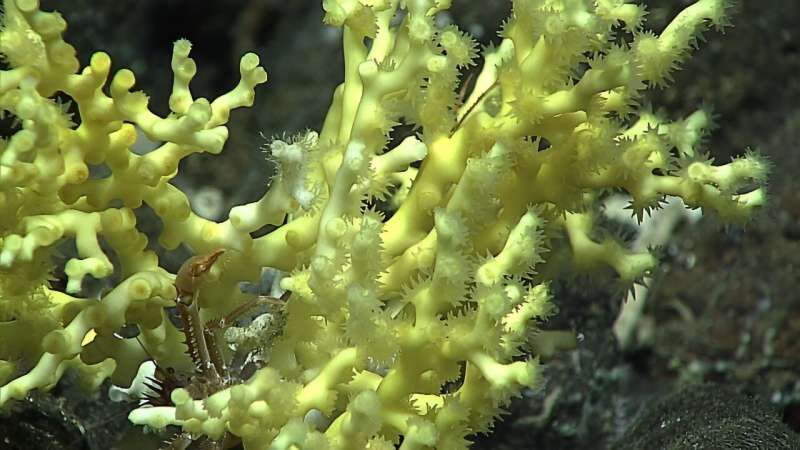This article has been reviewed according to Science X's editorial process and policies. Editors have highlighted the following attributes while ensuring the content's credibility:
fact-checked
peer-reviewed publication
proofread
Future-proofing deep-sea coral conservation in Aotearoa

Changing the way we manage Aotearoa New Zealand's oceans could save our biodiverse-rich, critically-endangered deep-water coral. Aotearoa New Zealand is a biodiversity hotspot for deepwater coral—approximately one sixth of the known deep-water coral species of the world have been recorded in our waters.
Deep-water corals are under threat due to ocean warming and acidification due to climate change as well as from the physical impacts of bottom trawling. Deep-water corals are ecologically important because they provide critical benthic structure for other species. Fish live inside their reefs and some of these reefs can extend large distances, covering hundreds of square kilometers. These reefs are also significant sites of carbon and nitrogen mineralization.
New research from Sustainable Seas National Science Challenge, published in Journal of Environmental Management, looks at marine conservation for deep-water corals to assess the impact of bottom trawling on coral habitats now and the effectiveness for protecting these habitats in the future. The findings show that bottom trawling impacts all coral taxa, but particularly reef-forming corals. Habitats will also decline in the future due to a changing climate.
"When designing protection for these coral with the usual approach, our study found that spatial marine protection is unlikely to provide enough conservation for deep-water corals in the future, due to shifts associated with climate change and fishing," says lead researcher Fabrice Stephenson.
The research identifies new areas for spatial marine protection that can provide protection for corals against a changing climate while still giving refuge to current populations. This is particularly important given the predicted reduction in coral habitat due to the cumulative effects of climate change and bottom trawling.
"Our results demonstrate the considerable risks associated with developing effective marine protected areas that do not account for combining current and future stressors," says Fabrice. "While deep-water corals in New Zealand illustrate this, the same approach is equally applicable to other marine species and for other locations."
It takes decades, if not centuries, for some species of deep-water coral to recover.
More information: Fabrice Stephenson et al, Implications for the conservation of deep-water corals in the face of multiple stressors: A case study from the New Zealand region, Journal of Environmental Management (2023). DOI: 10.1016/j.jenvman.2023.118938
Journal information: Journal of Environmental Management
Provided by Sustainable Seas National Science Challenge


















